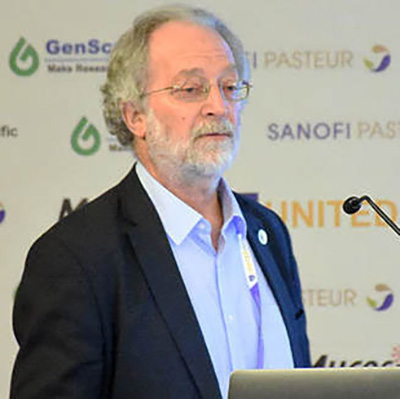Professor Graham Pawelec
Graham Pawelec, Ph.D., Habil earned his MA in Natural Sciences in 1978 and his Ph.D. in Transplantation Immunology in 1982 from the University of Cambridge, UK, and his Dr. habil and Venia Legendi from the University of Tübingen, Germany, where he became Professor of Experimental Immunology in 1997. From 1999 to 2017 he led the Tübingen Ageing and Tumour Immunology (TATI) group within the Second Department of Internal Medicine, University of Tübingen Hospitals System. He remains affiliated part-time with the department at the Center for Medical Research, University of Tübingen.
He is currently affiliated with the Cancer Solutions Program, Health Sciences North Research Institute of Canada, Sudbury, ON and is visiting Professor at Nottingham Trent University, UK, King’s College London, London, UK, and is an Honorary Professor at Manchester University, UK.
At the Cancer Solutions Program, his research interests are currently centered on alterations to immunity, especially T cell-mediated immunity, in ageing and cancer in man, and the influence these have on the outcome of vaccination and immunomodulatory antibody therapies. The impact of poly pathogenicity (including multiple infections, cancer, Alzheimer’s, diabetes, autoimmunity) as well as stress (psychological, nutritional) on immune signatures reflecting individual immune status is of particular interest in the clinical context.
He is Co-Editor-in-Chief of Cancer Immunology Immunotherapy and is Deputy or Associate Editor of several other journals. He has authored or co-authored 270 peer-reviewed original articles from a total of 486 PubMed-listed publications, has edited 3 books, and co-edited several.
Graham’s books include Basic Biology and Clinical Impact of Immunosenescence, Immunosenescence (Medical Intelligence Unit), Handbook on Immunosenescence: Basic Understanding and Clinical Application, and Handbook of Immunosenescence: Basic Understanding and Clinical Implications 2nd ed. 2019 Edition.
His peer-reviewed articles include Establishing High Dimensional Immune Signatures from Peripheral Blood via Mass Cytometry in a Discovery Cohort of Stage IV Melanoma Patients, Genetic Influence on the Peripheral Blood CD4+ T-cell Differentiation Status in CMV Infection, Cytomegalovirus Seropositivity Predicts a Decline in the T Cell But Not the Antibody Response to Influenza in Vaccinated Older Adults Independent of Type 2 Diabetes Status, Immune profiles of elderly breast cancer patients are altered by chemotherapy and relate to clinical frailty, and Differential Phenotypes of Myeloid-Derived Suppressor and T Regulatory Cells and Cytokine Levels in Amnestic Mild Cognitive Impairment Subjects Compared to Mild Alzheimer Diseased Patients. Read all of the publications related to his work.
He has coordinated three European Union collaborative programs on immunosenescence (EUCAMBIS, ImAginE and T-CIA) and two on cancer vaccine research (EUCAPS, ESTDAB). He was a member of the Sanofi-Pasteur-MSD and Sanofi-Aventis Advisory Boards on Immunosenescence and Vaccination, and of the WHO Initiative for Vaccine Research Advisory Board on the Impact of Ageing on Vaccination. His research interests remain centered on vaccination, cancer immunology and immunotherapy, and immune gerontology.
His honors and awards include the following:
- Visiting Professor, Nottingham Trent University, UK, 2005 – Present
- Honorary Chair, Manchester University, 2010 – Present
- Member of the Faculty of 1000 Oncology, 2012 – Present
- Fellow of the Gerontological Society of America (elected 2015)
- Visiting Professor, King’s College, University of London, 2016 – Present
Other Editorial Board Memberships:
Mechanisms of Ageing and Development (1996-), Experimental Gerontology (1997-)
Nutrition and Aging (2011-), Journals of Gerontology Series A (2013-), Age (2015-),
and Biogerontology (1999-).
Society Memberships:
British Society for Immunology, Deutsche Gesellschaft für Gerontologie und Geriatrie, Deutsche Gesellschaft für Immunologie, European Association for Cancer Research, Association for Immunotherapy of Cancer, American Association for Cancer Research, British Association for Research on Ageing, American Association for Clinical Oncology, Society for the Immunotherapy of Cancer, American Association of Immunologists,and Gerontological Society of America.
Reviewer for Granting Agencies:
Deutsche Forschungsgemeinschaft (DFG) Mildred-Scheel-Stiftung; German-Israel Foundation; Danish Council for Independent Research/Medical Sciences; European Research Council; National Institutes of Health; fortüne-Program University of Tübingen; Boehringer Ingelheim Fonds; British Medical Research Council (MRC); British Biotechnology and Biosciences Research Council (BBSRC); The Wellcome Trust (UK); Research into Ageing (UK); SPARC (UK); The National Kidney Research Fund (of Britain); Leukaemia & Lymphoma Research (UK); Dutch Cancer Society; Swiss Cancer Society; Swiss National Research Funds; Israel Science Foundation; Telethon Foundation, Italy; Association for Cancer Research (AIRC), Italy; Fondazione Cariplo, Italy; Austrian Federal Research Ministry (FWF); F.R.S.-FNRS (Belgium); Polish National Centre for Research and Development; EU-Commission (Biomed II, 1996; Marie Curie Fellowship Panel, 1997, 1998; Framework 5, Quality of Life, Generic 7.1, 1999; Midterm reviewer for project QLG1-1999-00050, 2001; Marie Curie Fellowships 2002, 2003; 6th Framework Consultant on Feasibility of European Cancer Research Networks, 2004; 6th Framework final Call for SME-led STREPs, 2006; 7th FP Health Call on Cell Therapy, 2009–2010 panels); Fondation pour la Recherche Médicale, Paris; National Institutes of Health, USA: NIAID Human Immunology Program, 2015; DFG Collaborative Research Center 1275 review panel, 2016; EU-TransCan2 2015 Call; and National Institutes of Health, USA: NIAID Human Immunology Program, 2016.
Read his Google Scholar profile and his LinkedIn profile. Read more about Graham at tati-group.de and tati-group.de/pivac.
